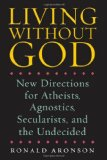Description
Ronald Aronson has a mission: to demonstrate that a life without religion can be coherent, moral, and committed. In the last few years, the “New Atheists”—Sam Harris, Daniel Dennett, Richard Dawkins, and Christopher Hitchens—have created a stir by criticizing religion and belief in God. Optimistic and stirring, Living Without God is less interested in attacking religion than in developing a positive philosophy for atheists, agnostics, secular humanists, skeptics, and freethinkers. Aronson moves beyond the discussion about what not to believe, proposing contemporary answers to Immanuel Kant’s three great questions: What can I know? What ought I to do? What can I hope?
Grounded in the sense that we are deeply dependent and interconnected beings who are rooted in the universe, nature, history, society, and the global economy, Living Without God explores the experience and issues of 21st-century secularists, especially in America. Reflecting on such perplexing questions as why we are grateful for life’s gifts, who or what is responsible for inequalities, and how to live in the face of aging and dying, Living Without God is also refreshingly topical, touching on such subjects as contemporary terrorism, the war in Iraq, affirmative action, and the remarkable rise of Barack Obama.
Contents
Introduction: Turning Toward Something 3
After Progress 25
Gratitude 43
The World on Our Shoulders 65
Taking Responsibility for Ourselves 91
Choosing to Know 123
Dying Without God 151
Hope 187
Notes 213
Index 237
Comment
Ronald Aronson demonstrates that atheism represents much more than what one does not believe: that it is the precondition for a generous humanism. The two closing chapters are models of stoicism at its best.”
— Christopher Hitchens, author of God Is Not Great, The Missionary Position: Mother Theresa in Theory and in Practice, and The Portable Atheist: Essential Readings for the Nonbeliever.
“Here’s an interesting new book … I recommend the book, not because I expect it to be convincing to everyone, but because it clearly makes the case for an interesting kind of conversation, and gives his side of it.”
– Taner Edis, Associate Professor of Physics, Truman State University; author of The Ghost in the Universe: God in Light of Modern Science, Why Intelligent Design Fails: A Scientific Critique of the New Creationism, Science and Nonbelief, and An Illusion of Harmony: Science And Religion in Islam
“Despite my occasional disagreements, overall Aronson gives us much to reflect on in this book, and much that will ring true for secularists looking for an affirmative naturalistic philosophy. There are many, many insightful observations on humanity, society, ethics and existence, organized by the particular question of life at issue, whether it be death, hope, responsibility, knowledge or social obligation. All this makes the book eminently worthwhile.”
– Tom Clark, Founder and director Center For Naturalism
The Italian political theorist Antonio Gramsci wrote from his prison cell in Mussolini’s Italy that “The challenge of modernity is to live a life without illusions, without becoming disillusioned.” In Living Without God, it seems to me, Aronson has admirably met that challenge.
– Doug Ireland, New Humanist
I just finished reading this book, and it’s terrific. It goes beyond the debunking of religion books to discuss how we go about understanding the world and society, and our place in both without the use of religious references, explanations and thought processes. It presents a very positive and liberating view of a truly secular worldview—a better world. I highly recommend it to those who liked the debunking books, and also to those with religious beliefs who recognize the need for and benefits of a humanistic/secular society.
– E. Gallion, Amazon Review




